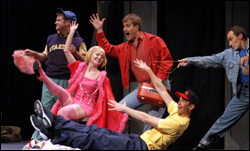STRAUSS’ COMPOSING career spanned over 70 years, from his early teens to his death in 1949 at age 85. Nurtured in German romanticism à la Mendelssohn, he stuck to his guns through the time of Schoenberg, past World War II, outliving Webern. During his life, and long thereafter, he was criticized for not conforming to the musical “advances” happening all around him, and the nostalgic, Mozartean neoclassicism of his 1916 opera Ariadne auf Naxos (playing through Sat., March 13, at McCaw Hall, 206-389-7676) was one of the primary cases against him. In the words of fierce ultramodernist Pierre Boulez: “History is much like the guillotine. If a composer is not moving in the right direction, he will be killed.”
But 55 years after Strauss’ death, what’s really been killed is the notion that music history’s next step is always predetermined. Strauss’ genre-bending, time-travel works like Ariadne turn out to be not retrogressive but prescient. Like Stravinsky and Ives, Strauss was a harbinger of our current Age of Eclecticism: Take what you need, from any time and anywhere, and make it your own. He’s a patron saint of all composers who follow their own path. (Boulez might be thought of as a patron saint of all composers who write exactly what’s expected of them.) By staying true to himself, Strauss turned out to be more forward-looking than his contemporaries could have imagined.
One of the particular joys of Seattle Opera’s current production of Ariadne is that it really honors this aspect of Strauss. The modern-day setting only points up how independent of the calendar his magic is. From the set’s clean, IKEA–esque lines to the purity of soprano Jane Eaglen’s voice, this production pays clever and eloquent homage to Strauss’ neoclassicism—ideals of beauty embodied in the role of the Composer himself, bubbling over with conviction in the power and worth of his own work.
THE PREMISE of the story is that an unseen wealthy patron has commissioned a tragic opera from an improbably idealistic young composer; its premiere is to be followed by a commedia-dell’arte skit as dessert. But at the last minute, the patron decides that in the interest of time, the two must be played simultaneously. Act I shows the chaotic backstage preparations; Act II is the opera-within-the-opera, retelling the Greek myth of Ariadne abandoned on the isle of Naxos, with irreverent interjections by the comedians.
Normally a baroque period piece, this production is set in the present. I was disappointed that SO let pass a lot of juicy satirical possibilities regarding opera productions and patrons, but there are still funny moments from Jane Eaglen in the title role, sending up both her usual casting as the epitome of highbrow operatic rectitude (Brunnhilde, Isolde, Turandot) while also playing against her reputation as possibly the nicest, most down-to-earth diva in the business. She enters in sunglasses and black leather, whacking her assistant with a bouquet of roses and swanning into her dressing room with a slam.
Act I offers slapstick, but the Act II Ariadne scenes, among the most rapturous pages Strauss ever wrote, are here played straight, and rightly so. The temptation to camp up the “serious” Ariadne story must have been considerable, but for the comedy to work—the clash of the two styles—both have to be given their due. The result is indescribably lovely. Eaglen, who replaced an indisposed Margaret Jane Wray a week before opening night, was absolutely, miraculously, at the top of her game, her soprano filling McCaw Hall with silken ease. John Horton Murray brought to the brief but grueling role of Bacchus a tenor that matched Eaglen’s voice in warmth and carrying power, though he wielded it with a notable unsteadiness.
Occasionally in Act I, the comedians crack wise about how dull the serious opera’s going to be, but the joke is Strauss’. The only time his comic music is as compelling as his Ariadne music is in the lead comedian Zerbinetta’s sparkling showpiece aria, tossed offwith insouciant charm by Jane Giering–De Haan. In the trouser role of the Composer, Kimberly Barber was splendidly ardent. Her voice had the passion, if not the size, to make her music soar. The transcendent glow of this opera’s final Ariadne-Bacchus duet, here capped with real onstage fireworks, becomes incomparably moving, even to a 2004 audience, simply because it’s honest music played and sung honestly.







